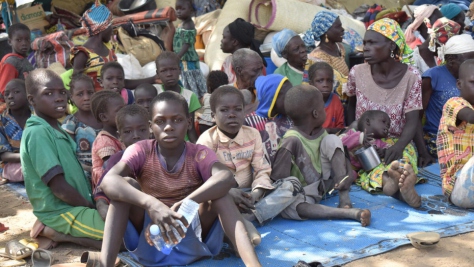Violence in northern Mali forces over 20,000 into exile
This is a summary of what was said by UNHCR spokesperson Adrian Edwards – to whom quoted text may be attributed – at today's press briefing at the Palais des Nations in Geneva.
UNHCR has deployed emergency teams to countries surrounding Mali to help meet the needs of some 20,000 people who have been forced to flee fighting in northern Mali. Most of the displaced are in Niger, Burkina Faso and Mauritania.
Fighting between rebel Tuareg groups and governmental forces in the Azawad region of northern Mali began in mid-January.
In the past three weeks, at least 10,000 people are reported to have crossed to Niger, 9,000 have found refuge in Mauritania and 3,000 in Burkina Faso.
In Niger, most of the new arrivals are from Menaka in Mali. Some have settled very close to the volatile border. Many of the new arrivals are sleeping in the open and have little access to shelter, clean water, health services, and food. People are scattered mainly in villages in Tillaberery, Ouallam, and Filingue districts, in the north of the country. Sinegodar, a village in Tillabery district, is hosting over 5,500 Malians, with one sole water point for the entire refugee and local population.
While most of those who recently fled Mali are Malians, recent arrivals in Niger also include nationals of Niger who had been living in Mali for decades. Many have been crossing the border between the two countries regularly to find grazing land for their cattle.
Local communities along the border, affected by the food crisis themselves in the Sahel, are sharing their resources with the new arrivals. The authorities have also distributed food. Four additional UNHCR staff are already in Niger and more are on their way. We plan to send aid for 10,000 people from our stockpiles in the region.
Our office in Ouagadougou, in Burkina Faso also reported the arrival of some 3,000 Malian Tuaregs following attacks on their homes and businesses in the Malian capital Bamako and in the nearby town of Kati last week. Many of the new arrivals are staying with host families in Ouagadougou and Bobo Dioulasso, 320 kilometres south-west of the capital. Other new arrivals have been reported in the north west of the country, especially near Djibo, in Soum province. An inter-agency mission, including UNHCR, is scheduled to go there by the end of the week to assess the needs of the people.
Meanwhile in Mauritania UNHCR has sent several missions to the village of Fassala, in the region of Hodh el Chargi 3km from the border with Mali, where over 9,000 people have arrived since 25th January. The mainly ethnic Tuareg Malian refugees come from the region of Léré on the other side of the border. They told UNHCR that they fled fighting between Government forces and rebel Tuareg fighters, fearing retaliation by army troops.
The Mauritanian authorities, with the support of UNHCR, are taking care of the new arrivals. Medical services are being offered by the local health clinics and water is being trucked in by the authorities. UNHCR Mauritania distributed 15-day food rations and non food items to cover the urgent needs of 5000 refugees in the refugee site of Fassala. Key needs identified are food, shelter and other basic items. UNHCR will strengthen its presence in Mauritania by fielding an emergency support team.
Fighting between the Tuareg liberation movement MNLA (Mouvement National de Liberation de l'Azawad) and governmental forces resumed on 17 January in Mali, breaking a 2009 agreement that had officially ended the Tuareg rebellion.
For further information on this topic, please contact:
- In Dakar: Helene Caux on mobile +221 77 333 12 91
- In Geneva: Fatoumata Lejeune-Kaba on mobile +41 79 249 3483
- In Geneva: Sybella Wilkes on mobile +41 79 557 9138
Related news and stories
Violence and threats by armed groups continue to displace refugees and civilians in Mali
Escalating violence leaves hundreds dead and hundreds of thousands on the move in eastern DRC
UNHCR urges greater support as violence continues unabated in Burkina Faso
Displaced people from climate frontlines raise their voices at COP27
UN warns of worsening conflict and displacement in Sahel without immediate climate action
UNHCR calls on States to refrain from forced returns of Haitians
-

Refugees in Cote d'Ivoire build back businesses despite COVID-19
22 Dec 2021 -

Hope for refugees in Angola as they receive COVID-19 vaccines
22 Dec 2021 UNHCR's advocacy efforts pay off as Angola includes refugees and asylum seekers in national COVID-19 vaccination campaign. -
Relief International
21 Dec 2021 -

Scale up support to Iran to safeguard fleeing Afghans, says UNHCR's Grandi
21 Dec 2021 -

Age Gender and Diversity Tip sheet - Helping to ensure AGD inclusive pledges and good practices for the GRF (ARABIC version, 2021)
21 Dec 2021 (ARABIC language version) This Tip Sheet builds on the progress made at the 2019 Global Refugee Forum (GRF) to help ensure pledges address gaps related to age, gender, and diversity (AGD), including disability, in refugee responses. -

Thousands of DR Congo refugees in Zambia opt to head home
21 Dec 2021 -

Clashes in Cameroon's Far North displace more than 100,000 people
17 Dec 2021 -

Big (Crisis) data for predictive models - A literature review
17 Dec 2021 This report summarizes the academic and grey literature on the usage of big data sources in the modelling and prediction of forcibly displaced persons. Based on the findings, it highlights possible avenues for UNHCR to include big data sources into their work. -

Guidelines on supervised independent living for unaccompanied children
17 Dec 2021 This guideline seeks to assist UNHCR and partner staff working on child protection and guide them in assessing and making decisions on the most appropriate alternative care, establishing and supporting supervised independent living arrangements, and monitoring and follow-up for unaccompanied children.
